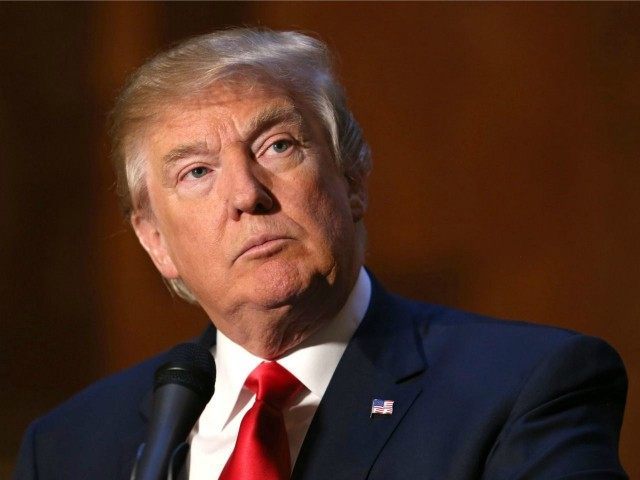Left-wing activists who breathlessly claimed that lawsuits against President Donald Trump for allegedly violating the Constitution’s Emoluments Clauses would lead to his expulsion from office are now probably disappointed because a Clinton-appointed federal judge has dismissed the lawsuit.
President Trump has vast real estate and business interests in the United States and around the world. These are out of his hands because they are held in a trust. His private-sector sons now run the family business while he is in office, and while the president was still a private citizen, he set up a process whereby any profits his hotels and other properties receive from foreign sources will be automatically donated in full to the U.S. treasury.
Around the time of his Inauguration, the president was sued by a liberal advocacy group, Citizens for Responsibility and Ethics in Washington (CREW), joined by some hospitality-industry plaintiffs (hotels and restaurants). They argued that it was unconstitutional for Donald Trump to serve as president without completing severing all connections to his business interests and suggested that he could not effectively do so and thus is ineligible to be president.
As Judge George Daniels of Southern District of New York explained in his December 21 opinion dismissing the case, “Plaintiffs principally allege that Defendant’s ‘vast, complicated, and secret’ business interests are creating conflicts of interest and have resulted in unprecedented government influence in violation of the Domestic and Foreign Emoluments Clauses.”
The Domestic Emoluments Clause in Article I of the U.S. Constitution forbids any federal official from getting any pay from the federal government except for his salary and standard compensation and forbids any payments by any state.
The Foreign Emoluments Clause is in Article II, and it forbids a president from receiving payments or things of value from foreign governments without the consent of Congress.
The lawsuit says that whenever a foreign delegation rents a room at Trump Hotel in D.C., or any American state or foreign nation conducts any transaction with any Trump-affiliated business, that those activities violate one of the Emoluments Clauses.
Daniels — who was appointed by President Bill Clinton — focused on Article III of the Constitution, which defines and strictly limits the jurisdiction of federal courts to decide lawsuits. Among other things, Article III limits jurisdiction to lawsuits where the plaintiff has suffered a concrete injury, that the court traces back to the defendant, and which the court can fix by issuing the relief the plaintiff is requesting in the lawsuit.
The hospitality plaintiffs claimed that Trump’s election made his name such a big draw that it was costing their hotels and restaurants customers, who were going to Trump-named properties instead. The court rejected that argument, holding “the connection between the Hospitality Plaintiffs’ alleged injury and Defendant’s actions is too tenuous to satisfy Article III’s causation requirement.”
The court further held that the plaintiffs additionally lacked standing because that failed to show “that it is likely, as opposed to merely speculative, that the injury will be redressed by a favorable decision.”
“Nothing in the text or history of the Emoluments Clauses suggests that the Framers intended these provisions to protect anyone from competition,” Daniels continued.
The district court also held that CREW lacked standing to bring a federal lawsuit. “CREW fails to allege either that Defendant’s actions have impeded its ability to perform a particular mission-related activity, or that it was forced to expend resources to counteract and remedy the adverse consequences or harmful effects of Defendant’s conduct,” Daniels held.
Although the Constitution requires that a lawsuit always be dismissed when the plaintiffs lacked standing, the Manhattan-based court held that the political question doctrine provides a second reason federal courts lack authority to decide this matter.
“The political question doctrine has its roots in the separation of powers and is ultimately a doctrine of justiciability,” the judge explained. “It bars courts from deciding cases that are inappropriate for judicial resolution based on a lack of judiciary authority or competence, or other prudential considerations.”
The court reasoned that this lawsuit’s issue “under the Foreign Emoluments Clause is whether Defendant can continue to receive income from his business with foreign governments without the consent of Congress.” The court concluded that as the “explicit language” of the clause “makes clear, this is an issue committed exclusively to Congress.”
“As the only political branch with the power to consent to violations of the Foreign Emoluments Clause, Congress is the appropriate body to determine whether, and to what extent, Defendant’s conduct unlawfully infringes on that power,” Daniels reasoned.
Although the establishment media made quite a fuss over the filing of this lawsuit, there has not been much coverage regarding this decision. The plaintiffs say they will appeal the dismissal to the U.S. Court of Appeals for the Second Circuit.
The case is CREW v. Trump, No. 1:17-cv-458 in the U.S. District Court for the Southern District of New York. Two other lawsuits raising similar issues are still pending, one in Maryland and the other in Washington, DC.
Ken Klukowski is senior legal editor for Breitbart News. Follow him on Twitter @kenklukowski.

COMMENTS
Please let us know if you're having issues with commenting.